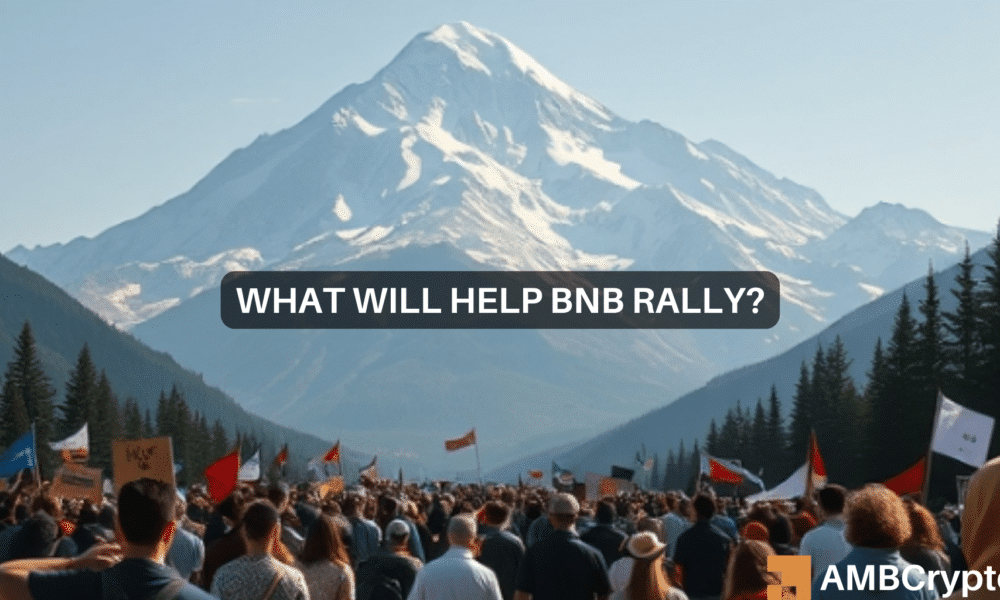Binance Smart Chain has recently seen a surge in active addresses, indicating a significant increase in network activity. This spike in engagement has led to a gradual decrease in the supply of Binance Coin (BNB) on exchanges, potentially setting the stage for a supply squeeze.
Despite these positive developments, the growth of BNB has been relatively slow compared to other top market-cap tokens. While it has experienced a modest 29.65% gain over the past month, the daily trend shows a 4.85% drop, suggesting some weakness in the short term.
However, analysis by AMBCrypto suggests that BNB still has room for further upside, with expectations of continued price appreciation in the future.
The recent surge in active addresses on the Binance Smart Chain, reaching 751,000, is a promising sign for the network. This uptick in activity indicates stronger fundamentals and increasing network utilization, potentially paving the way for a price surge in BNB.
Historically, during the 2021 bull market, BNB Chain reached an all-time high of approximately 1.5 million active addresses. If the current market follows a similar trajectory, BNB could see a significant price increase as more users join the network.
Furthermore, there are signs of a potential supply squeeze on BNB as more tokens are leaving exchanges than entering. This trend, coupled with increasing demand, could lead to a notable price surge for the asset in the near future.
Supporting indicators for a bullish trend include BNB’s funding rate, which has shown significant growth in recent days. The funding rate, currently at 0.0650%, indicates that long traders are actively supporting the market, which could lead to price stability and potential upside.
Additionally, the OI-weighted funding rate, which combines funding rates with open interest, remains in the positive zone and has been rising. This suggests a strong likelihood of an upward price movement for BNB in the coming days.
With multiple factors aligning, including rising active addresses, historical patterns, and derivative metrics, BNB appears poised for a potential price surge in the near future. Investors and traders are advised to keep an eye on these developments as they unfold. The Impact of Social Media on Mental Health
Social media platforms have become an integral part of our daily lives, allowing us to connect with others, share our thoughts and experiences, and stay updated on current events. While social media has many benefits, such as facilitating communication and fostering a sense of community, it also has a dark side that can negatively impact our mental health.
One way in which social media can harm mental health is by promoting unrealistic standards of beauty and success. Many users on platforms like Instagram and TikTok post carefully curated photos and videos that showcase only the best aspects of their lives, leading others to compare themselves and feel inadequate. This can contribute to feelings of low self-esteem, body image issues, and anxiety.
Moreover, social media can also be a breeding ground for cyberbullying. With the anonymity that the internet provides, individuals may feel emboldened to make hurtful comments or spread rumors about others. This can have a devastating impact on the mental health of those targeted, leading to feelings of shame, isolation, and even thoughts of self-harm.
Additionally, the constant exposure to negative news and information on social media can also take a toll on mental well-being. In today’s digital age, we are bombarded with news stories about violence, political unrest, and natural disasters, which can leave us feeling anxious, hopeless, and overwhelmed. The 24/7 news cycle on social media can make it difficult to unplug and take a break from the negativity, leading to increased stress and burnout.
Furthermore, the addictive nature of social media can also have detrimental effects on mental health. The constant need to check notifications, scroll through feeds, and seek validation from likes and comments can lead to feelings of anxiety, loneliness, and depression. Spending excessive amounts of time on social media can also detract from real-life interactions and activities, further exacerbating feelings of isolation and disconnection.
In order to mitigate the negative impact of social media on mental health, it is important to practice mindfulness and set boundaries when using these platforms. This can include limiting screen time, unfollowing accounts that make you feel bad about yourself, and taking breaks from social media when needed. It is also crucial to prioritize self-care and seek support from friends, family, or mental health professionals if you are struggling with your mental health.
In conclusion, while social media can be a powerful tool for connecting with others and sharing information, it is important to be mindful of its potential impact on mental health. By being aware of the negative effects of social media and taking steps to protect our well-being, we can cultivate a healthier relationship with these platforms and prioritize our mental health.

